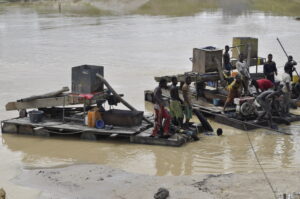 By: Prince Appiah
By: Prince Appiah
Before the sixties our river was producing hydro electricity for the mining company so the people of Prestea did not rely on the national grid”.
That’s a description by a resident of the Western Region mining town of the once beautiful story of one of Ghana’s largest water basins – River Ankobra.
It was the pride of the people. Taking its source from North East of Wiawso, the river snakes its way 190 kilometers southwards into the Gulf of Guinea.
For communities along its banks, River Ankobra was the source of livelihood for many people.
Large quantities of fish from the once clean and aquatic habitat provided income to fishermen and all those in the distribution chain.
“People living close to the river were using it to bathe, others got their daily bread from it because people were fishing in it. At the time the water was clean”, another resident explained to me.
The good old days are gone, and in the last fifteen years or more, things have gone bad, and they are getting worse by the day, with the attendant health risk.

The banks of River Ankobra in the Prestea Area in the Western Region have become a business hub for illegal miners whose activities cause pollution.
Ironically, locals appear not only apathetic but are contributing to the destruction as hundreds wash raw dust into refined gold in their most precious resource – the river.
Nimfahene of Prestea-Hemang Traditional Area, Nana Tikol the second, laments, “there have been these small scale miners all over the river so this contaminated water we see here is due to the activities of the galamsey operators’’.
Now looking brownish and milky, water in the Ankobara has lost its potential, having been reduced only to a gold- washing agent here in the Prestea-Huni Valley District.
Illegal miners, mostly from outside the community , have erected make-shift wooden structures close to the Ankobra River where they pump water to process gold ore.
Waste water goes back into the river, polluting it further. Unfortunately, most of the streams which run into Ankobra River have also been polluted so they all bring their dirty water into it.
“Until small scale mining became popular that people started to extract gold from it, and as they extract and wash in it the water became dirty,” says Dominic Nyame, a resident and ex-miner.
A recent report submitted to the Water Resources Commission by the Water Research Institute on Groundwater Inventory and Hydro-geological Assessment on the Ankobra River Basin indicated that there are traces of metal in the groundwater within the basin. This poses a risk to human health.
The report further reveals that there are about 293 boreholes drilled in the basin.
Prestea is one of the communities that currently rely on bore-holes drilled from the basin as a source of drinking water, with the attendant health risks.
According to the report, 57 per cent of households depend on boreholes and wells.
“This one is not dirty water, it is Ankobra-if you use it to wash the gold you see the gold clean (it becomes clearer)”, a miner explains the preference for water from River Ankobra in the washing of gold dust.
The business at the hub employs persons across ages, without discrimination.
 Nana Danse is a 16-year old school drop-out. He has been working as aide to galamsey operators for four years.
Nana Danse is a 16-year old school drop-out. He has been working as aide to galamsey operators for four years.
He couldn’t continue schooling because he is considered ‘block-headed’, besides inability of his parents to afford the cost of educating him.
“It has helped me. I don’t go to school anymore because I am dumb; I couldn’t get anything the teacher taught in class. I was last all the time. I figured school is not my thing,” he concluded.
According to him, the work has helped him because he can survive and manage problems in the house. “I can support my family,” he emphasizes.
“So far, I don’t need to wait for the end of the month to get enough money. I can get between Gh¢20 and Gh¢50 in a day. When I get that I go home. This work has helped me,” he added.
Meet 60- year-old Agya Kofi Baah, a watchman. He washes and extracts gold from ore as a part-time job.
Before joining the business, the old-man sold second-hand clothing in Kumasi. He lost his day’s sales and entire investment one evening on his way home.
Armed robbers attacked and robbed him of Gh¢15,000 cedis, a situation that compelled him to travel to Prestea for greener pastures.
Agya Baah tells me business is good. “This short period I have made more than a hundred million Ghana cedis.I bought a land for about Gh¢37 million. Just two weeks ago, I paid for 3,000 blocks and 40 bags of cement from this business.”
All these Agya Baah has been able to accomplish within a little over eight months.
Nana Danse and Agya Kofi Baah are among many labourers who, together with their masters, are destroying such an important natural resource for their survival.
Until drastic action is taken to halt the wanton destruction, River Ankobra will eventually
Source: http://www.myjoyonline.com/news/2015/October-27th/ankobra-river-a-haven-for-fish-turned-into-gold-washing-tailings.php#sthash.DzpsKDhp.YDOt4vw5.dpuf